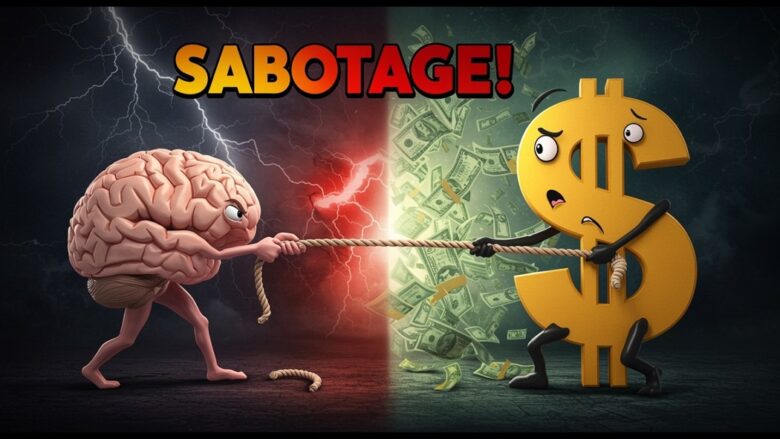You might think your financial strategy is perfect—a budget, savings goals, and an investment plan are all in place. But your brain might be secretly working against you. Our brains are filled with biases that can thwart even the most well-laid plans, from emotional spending and procrastination to worrying about stock market drops. These behaviors are instinctive patterns of evolution and survival, not just bad habits. Understanding these mental traps can empower and enlighten you. Understanding how your mindset leads to financial mistakes can help you proactively change these behaviors and stay on track. This article explores the psychology of financial self-sabotage and how to address it.
Instant Gratification vs. Long-Term Goals:
Our tendency to prioritize immediate gains over future gains is a serious mental trap. Because of this “present bias,” buying a new phone now feels better than investing for retirement 30 years from now. Our brains evolved for short-term survival, not financial planning. This bias arises when we put savings aside to go shopping or don’t increase our retirement savings because the benefits seem too distant. The solution is to reframe future aspirations into something that emotionally stimulates us today. By keeping track of visual goals, giving your savings account a fancy name, or linking your financial goals to lifestyle changes you consider important, you can trick your brain into focusing on the future.
Market Volatility and Fear: Why We Panic Sell
Your financial plan may include long-term investing, but a stock market crash can trigger the urge to sell. The amygdala in your brain reacts to perceived threats. This leads to panic selling, where you sell at the bottom and buy at the top. While your mind tells you to “stay the course,” emotions often take over. Such behavior wastes money and derails your ambitions. The solution lies in developing mental resilience in advance of any challenges. Avoid fear-based judgments by committing to your strategy beforehand, automating your investments, and consulting an advisor during a recession. Mindfulness or journaling can reduce emotional reactivity, which doesn’t prevent market volatility but can strengthen your investment decisions.
The Cost of Delayed Decisions:
We put off budgeting, emergency funds, and saving, even when we know we should. This delay is caused by “time discounting,” where we underestimate future consequences and overestimate immediate comfort. Indecisiveness and overwhelm cause many people to postpone important financial decisions. The solution? Reduce your workload. Instead of setting large financial goals, start with small actions, such as automatically depositing $10 or using a budgeting tool for a week. Small victories create momentum. Defaults, reminders, and accountability partners can make decisions easier and reduce psychological resistance.
Overconfidence and the Delusion of Control:
Your brain likes control, but it’s an illusion. Overconfidence in our financial acumen can lead us to pick stocks, time the market, or ignore advice. Research shows that most people overestimate their ability to beat the market, which can lead to riskier behavior, losing trades, and misallocation of resources. Blind spots arise because we don’t plan for risks we think we can overcome. To avoid overconfidence, practice financial humility. Diversify your assets, use checklists for important decisions, and consider engaging a fiduciary advisor. Reflect on past mistakes and learn from them instead of judging them. Knowing you don’t know is good planning, not weakness.
Anchoring and the Mental Accounting Fallacy:
Have you noticed that people perceive money differently depending on where it comes from? A tax refund feels like a bonus, while a paycheck feels precious. This is mental accounting. The traditional anchoring effect refers to holding on to a bad investment because you paid a high price for it. These psychological quirks can affect your budgeting, spending, and investing. For example, you might spend your lottery winnings while saving money from your paycheck or refuse to sell a stock you bought at a high price but whose price is still falling. Addressing these issues requires logical and consistent money management. Treat all money equally and make financial decisions based on current data, not old ones. Regular financial reviews can help you overcome these biases and think rationally.
Social Comparison and Lifestyle Inflation:
Your neighbor got a new car. My colleague booked a wonderful trip. Savings goals lose their appeal. Your mind compares you to others, and when you increase your spending to maintain your status, “lifestyle creep” occurs. Such behavior hinders wealth accumulation. The solution is a values-based budget. Balance your spending with your desires, not the opinions of others. Managing social media or setting digital boundaries can reduce the temptation for envy. Regularly evaluate your goals for financial freedom.
Information Overload and Analysis Paralysis:
The digital age is inundated with financial information, but your brain can’t process it all. Information overload can lead to analysis paralysis, where the fear of making the wrong choice hinders decision-making. Too many choices can hinder progress, whether it’s choosing the “right” mutual fund or a debt repayment strategy. To avoid this, narrow your options and establish criteria before conducting research. Rely on carefully curated tools or advisors that can simplify complex data. Making a well-informed financial decision today is better than planning a perfect decision that will never be made.
Loss Aversion and Fear of Regret:
Losses hurt twice as much as gains. People avoid investing, continue pursuing risky financial patterns, or postpone career changes because of loss aversion. Anticipating regret can also hinder decision-making. Shift your focus to opportunity cost: what you lose by not taking action. Imagine gains, not losses. Treat failures as feedback and learn from them through a decision journal. Growth requires risk, and managing the fear of loss means stopping savings, not saving itself.
Conclusion:
While your brain is brilliant, it often works against your financial interests. Psychological pitfalls—from emotional reactions to deep-seated cognitive biases—are real, but they can be addressed. Financial empowerment starts with understanding these tendencies. When it comes to money, make your emotions your friend, not your enemy. You can outsmart your brain and continue to achieve your financial goals through strategy, awareness, and positive habits. Ultimately, wealth lies in mastering the mindset that creates numbers.
FAQs:
1. Why does my brain refuse to save money, even though it knows it should?
This is due to present bias. Your brain prioritizes immediate pleasure over future rewards, making saving feel like a sacrifice.
2. How can I avoid emotional spending when I’m bored or stressed?
Once you’ve identified your triggers, replace your spending with non-financial coping mechanisms. Try writing a letter, exercising, or calling a friend before you buy something.
3. Why do I panic during market downturns when I really shouldn’t sell?
My brain interprets market downturns as dangerous. This triggers “fight-or-flight” emotions, disrupting rational thinking. Plan and seek support from an advisor to stay calm.
4. Is overconfidence in investing harmful?
Yes. Overconfidence can lead to reckless trading, poor judgment, and ignoring expert advice. A modest, diversified investment strategy generally yields long-term returns.
5. Can I adjust my thinking to make better financial decisions?
Of course. Automation, mindfulness, and behavior modification can improve behavior and reduce self-sabotage with practice.




